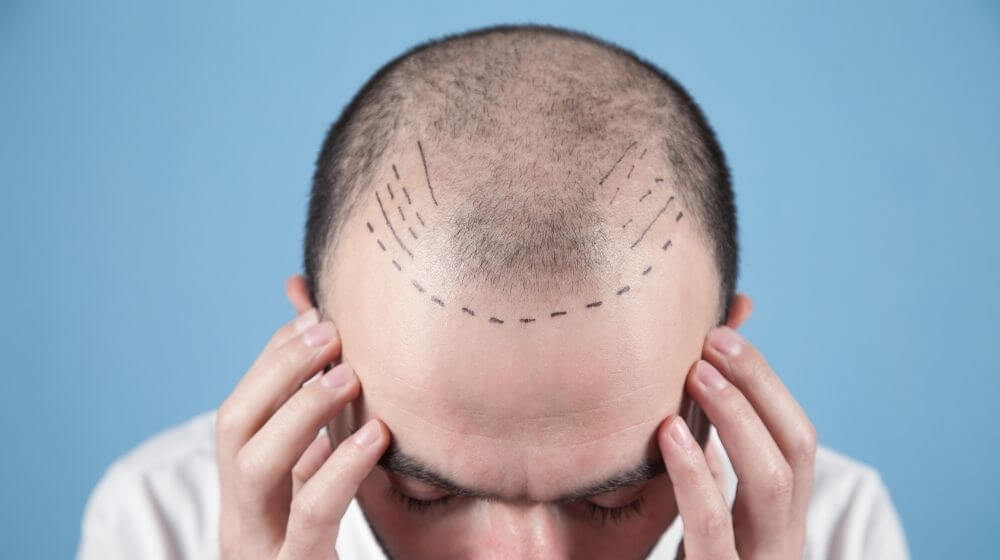According to Wikipedia, Hair transplantation is a surgical technique that removes hair follicles from one part of the body, called the ‘donor site’, to a bald or balding part of the body known as the ‘recipient site’. The technique is primarily used to treat male pattern baldness.
Who does not want to look handsome or beautiful? almost everyone wants to, right. As hair is one of the factors considered to look handsome or beautiful across the world.
Baldness In Men & Side Effects Of Hair Transplants
Read More: Fruit Juices For Hair Growth
So What Causes Hair Fall?
The very first and obvious reason can be a family history. The genes which you have inherited from your parents can be the reason behind hair fall. And hair fall can start to happen as early as around your teens and eventually your hair follicles shrink and stop producing hair causing baldness.
Some of the other reasons are medical issues like thyroid or anemia. Hair fall is also caused due to the use of drugs like cancer, high BP, arthritis, etc, due to high-stress levels, low immune system, etc.
So what do people do to get their hair back?
They try following a healthy lifestyle like eating healthy and doing some kind of physical and mental exercise or taking some medications. Some have hair transplants also. But the question here lies is will hair regrow? the answer to the question depends on the hair follicle. whether it is closed, disappeared, or still intact. If intact then there is the possibility of regrowing or else no. by the above methods one can regrow if the follicle is intact.
So when does one do hair transplantation?
It is done if you’re balding or thinning naturally or have lost hair due to an injury. Most hair transplants are done with your existing hair that is got from the donor site. They may not be effective for treating people with widespread thinning and baldness, hair loss due to chemotherapy, or other medications.
So, As long as you have a decent supply of the donor’s hair you can have a hair transplant.
The picture shown below is the process of doing hair transplantation.
However, there are two main methods to do a hair transplant, one is FUSS ( Follicular unit strip surgery ) where the surgeon strips the donor area and does grafting, and then the donor area is stitched back. The other is FUE (Follicular unit extraction ) whereby using a tiny punch tool hair follicles are removed from the donor area. this procedure leads to scars that may not be much noticeable.
Every method has some pros and cons. so even the hair transplanting methods got some side effects which are long-term and short-term.
Some of the short term complications are:
- Bleeding and swelling – After grafting is done the area may become reactive causing bleeding and swelling. This also means the transplanted area requires some time to adjust to the graft.
- Itching- It is quite common to have an itching problem but make sure not to scratch the transplanted area as it may displace hair follicles. If the itching continues for a long better consult doctor
- Infection- It is very rare to get infections and this infection is called folliculitis and can occur as a complication of a hair transplant consult a doctor and get a mild lotion for relief and cure.
Other effects are numbness, pain, discomfort, etc.
Some of the long term complications are:
- Scalp laxity- Doctors may under or overestimate the scalp laxity which is nothing but the elasticity of your scalp thereby causing disfigured scars which are the result of skin laxity
- Unnatural look- this is due to hair curling. after some time of surgery, hair gets curly leading to looking like unnatural hair. your new hair does not match the existing hair leading to an unnatural look
- Grafting failure– The implanted grafts sometimes fail to cooperate with each other, leading to re-surgery. These can be repetitive for one patient and the graft failure can happen again and again.
Now that you know all the benefits and side effects of transplanting hair, it is in your hand either to proceed with hair transplanting or not. But if you want to have transplantation be aware of the surgeon who is operating and also take possible care after the surgery.
STAY HEALTHY AND LOOK HEALTHY
You’ll also like:
- Mehndi Herbal Oil for Hair Growth
- Is Sweet Potato Good For Hair Growth?
- Spinach For Hair Growth – Benefits, Side Effects (Precautions), How To Use/Apply
- Ayurvedic Way to Reduce Hair Fall
- Pros and Cons of Ironic Blow Hair Dryers

